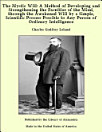Etruscan Roman Remains
jan. 2007 · Cosimo, Inc.
E-bok
400
Sidor
family_home
Kvalificerad
info
reportBetyg och recensioner verifieras inte Läs mer
Om den här e-boken
The Etruscans are one of history's great mysteries -- a sophisticated society that flourished at the heart of the Classical world and then vanished, leaving relatively few archaeological remains and few records of their culture. The Etruscans were adept at magic, and Etruscan books of spells were common among the Romans but they have not survived. While greatly influenced by the Greeks, the Etruscans retained elements of an ancient non-Western culture, and these archaic traits contributed greatly to the civilization once thought of as purely Roman (gladiators, for example, and many kinds of divination). Leland retrieves elements of Etruscan culture from the living popular traditions of remote areas of the Italian countryside where belief in "the old religion" survives to an astonishing degree. Recorded when many of these secret beliefs and practices were fading away, this remarkable volume deals with ancient gods, spirits, witches, incantations, prophecy, medicine, spells, and amulets, giving full descriptions, illustrations, and instructions for practice.
Om författaren
Charles Godfrey Leland was born in Philadelphia on August 15, 1824, the eldest child of commission merchant Charles Leland and his wife Charlotte. Leland loved reading and language. When he moved to Europe to study law, he became intrigued with German culture, gypsy lore, the language of Romany, and Shelta, an ancient dialect spoken by Irish and Welsh gypsies. After his law studies were completed, Leland became a journalist, working for such periodicals as P.T. Barnum's Illustrated News, Vanity Fair, and Graham's Magazine. The mid-to-late 1850s were very eventful for Leland; he published his first book, Meister Karl's Sketch-Book in 1855 and married Eliza Bella Fisher in 1856. What probably clinched his fame was "Hans Breitmann's Party" a German dialect poem that he wrote under the pen name Hans Breitmann and that captured the Pennsylvania Dutch dialect and humor. While he was best known for his essays, poetry, and humor, Leland also firmly believed that the industrial arts were the keys to a good education, and he wrote many textbooks on the subject. Leland spent most of the latter part of his life in Europe, writing a wealth of books. He died in Florence, Italy, on March 20, 1903.
Betygsätt e-boken
Berätta vad du tycker.
Läsinformation
Smartphones och surfplattor
Installera appen Google Play Böcker för Android och iPad/iPhone. Appen synkroniseras automatiskt med ditt konto så att du kan läsa online eller offline var du än befinner dig.
Laptops och stationära datorer
Du kan lyssna på ljudböcker som du har köpt på Google Play via webbläsaren på datorn.
Läsplattor och andra enheter
Om du vill läsa boken på enheter med e-bläck, till exempel Kobo-läsplattor, måste du ladda ned en fil och överföra den till enheten. Följ anvisningarna i hjälpcentret om du vill överföra filerna till en kompatibel läsplatta.








